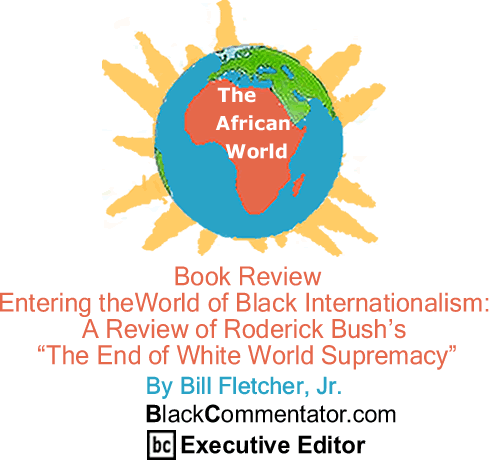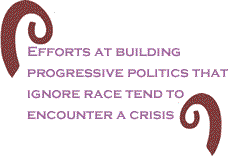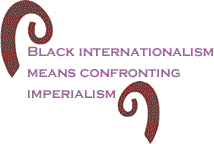
|
||||||||||||||||||||||
|
|
 |
|
Roderick
Bush, The
End of White World Supremacy: Black Internationalism and the Problem
of the Color Line (
Central
to Bush’s framework is the notion that racism cannot be separated
from capitalism. This thesis, while certainly not new, is internationalized
by Bush. Bush describes the emergence of capitalism as, from the
outset, a global phenomenon and one that could never have been successful
had it not been for the combination of the African slave trade and
the invasion and conquest of the The practical implications of this framework are significant. If race is not an add-on to capitalism but, instead, is central, then a progressive politics that is not explicitly anti-racist should be inconceivable. Further, that efforts to construct a progressive, if not Left, politics that fail to appreciate the significance of race are doomed to failure.
What intrigued me about the book, however, was the framework that Bush lays out for understanding Black radicalism. In using the term “Black internationalism” Bush suggests, not so much a separate political current, but rather an approach to the struggle for Black freedom that has been a component part of much of what has come to be known as Black radicalism. In reading the book I was trying to understand the difference between Pan Africanism and Black internationalism, at first not sure whether this was a distinction without a difference. Actually, Pan Africanism represents a certain ideological current within the Black freedom struggle whereas Black internationalism represents an approach that contextualizes the Black freedom struggle internationally. As Bush illustrates, looking at the career of both Malcolm X and the later Martin Luther King, one sees their efforts to place the struggle for Black freedom not in the context of a minority fighting for rights, but rather in the context of the struggles that were underway globally for national liberation and against colonialism and neo-colonialism. What Bush offers is a way of understanding that such an approach was not unique to Malcolm and King, nor to the 1960s, but represented an approach that went back at least to the early 19th century. A Black internationalist approach is not a romantic framework. Bush helps the reader to understand Black internationalism as a combination of the result of the enslavement of Africans, brought to the Western Hemisphere, on the one hand, and the reality of our - Black people - conducting a freedom struggle in the heart of an empire, on the other. Black internationalism means confronting imperialism, whether one emerges from a nationalist, Pan Africanist, socialist, communist, or some combination of each, tradition. It is to be distinguished from those who have seen the Black freedom struggle as unique and apart from other global struggles for justice. While
I overwhelmingly recommend this book, I found that I had differences
with Bush on a few matters. Substantively, while Bush demonstrates
the connection between modern racism and capitalism, he seems to
downplay the manner in which it was constructed in the A
second substantive concern I had revolved around the entire question
of nationalism. Bush gives a passionate defense of nationalism as
a mechanism that logically emerges in the face of national oppression
and racism. I am in agreement. Yet there is little contained in
the book that is a developed critique of the evolution of nationalism,
not only in the In
the face of what Egyptian theorist Samir Amin calls the crisis of
the national populist project, nationalism in the global South (and
While
nationalism among African Americans continues to have a mainly progressive
character, it is certainly the case that matters have become more
complex over the last twenty to thirty years. My final point is one that I raise reluctantly. The End of White World Supremacy is a well-researched and documented book. Of this, there is no question. Yet Bush tends to present his material very often through the voices of others. In that sense the book tends toward a literature survey. While it is useful to know what other authors are writing concerning the same subject, I kept finding myself wanting to know, much more explicitly, the thinking of the writer whose book I had in front of me. In that sense, I wanted more of Bush’s own, original thinking, rather than commentary on the insights of others.
BlackCommentator.com Executive Editor, Bill Fletcher, Jr., is a Senior
Scholar with the Institute
for Policy Studies, the immediate past president of TransAfrica Forum
and co-author of, Solidarity Divided: The Crisis in Organized Labor and a New Path
toward Social Justice
|
|
 |
|
Any BlackCommentator.com article may be re-printed so long as it is re-printed in its entirety and full credit given to the author and www.BlackCommentator.com. If the re-print is on the Internet we additionally request a link back to the original piece on our Website. Your comments are always welcome. eMail re-print notice
If you send us an eMail message we may publish all or part of it, unless you tell us it is not for publication. You may also request that we withhold your name. Thank you very much for your readership. |
|
| |
|
| September17
, 2009 Issue 342 |
|
| Executive Editor: Bill Fletcher, Jr. |
| Managing Editor: Nancy Littlefield |
| Publisher: Peter Gamble |
| Est. April 5, 2002 |
Printer Friendly Version
in resizeable plain
text format or pdf
format. |
 |

|
| |
| |































 European
communist and socialist movements that downplayed the importance
of challenging colonialism and racism often found themselves complicit
in colonial oppression. One notorious example of this was the French
Communist Party that was quite late in recognizing that the struggle
for Algerian independence was one that it needed to actively support.
European
communist and socialist movements that downplayed the importance
of challenging colonialism and racism often found themselves complicit
in colonial oppression. One notorious example of this was the French
Communist Party that was quite late in recognizing that the struggle
for Algerian independence was one that it needed to actively support.
 Nationalism,
for much of the 20th century was overwhelmingly progressive, if
not revolutionary, in its fight against colonialism and empire.
But it was also a nationalism that tended NOT to restrict itself
to a particular ethnic group. Vietnamese nationalism, for instance,
was inclusive of various ethnic groups within
Nationalism,
for much of the 20th century was overwhelmingly progressive, if
not revolutionary, in its fight against colonialism and empire.
But it was also a nationalism that tended NOT to restrict itself
to a particular ethnic group. Vietnamese nationalism, for instance,
was inclusive of various ethnic groups within  Ethnic
nationalism has emerged within Black America in which, for instance,
“Black” is no longer the inclusive category used in the 1960s and
1970s, but for many people means African Americans native to the
Ethnic
nationalism has emerged within Black America in which, for instance,
“Black” is no longer the inclusive category used in the 1960s and
1970s, but for many people means African Americans native to the










